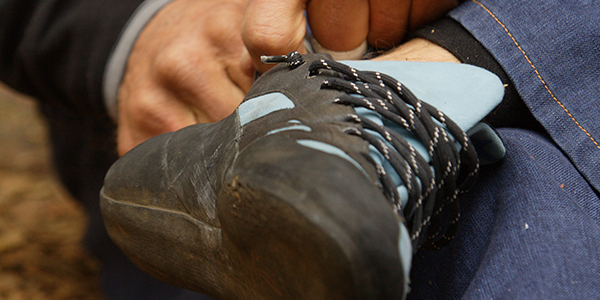Our friends over at The Clymb gave some awesome tips on how to rid your climbing shoes of that oh-so-familiar nasty smell you’ve been cooking up. Read below to find some ways to fight it.
Dragon foot. The sweet, hot garbage. The smell that wafts from your gym bag or crag sack and reminds you of French cheeses, vomit, mushrooms, and celebrity-endorsed perfumes. You have a problem, and your friends may or may not have mentioned it yet. Every time you put on your climbing shoes, you feel like you’re making a deal with the devil. Sure, those shoes fit perfectly and will help you crush, but they smell like Oscar the Grouch’s living room, and your feet are touching them directly. Ew.
But fear not — there is a whole industry devoted to fixing stankfoot, with powders, creams, sprays, voodoo dolls, crystals, etc. But to fix the stink in your shoes you really can’t just use one of these options, you have to understand the root cause. Your feet don’t smell. Your shoes don’t smell. What smells is the waste products from the bacteria that are growing, eating, and thriving on the sebum, skin cells, and dirt in your warm, wet climbing shoes. Grossed out yet? Sorry. But honestly, these bacteria are harmless to you, just offensive. Heed the words in this article and you will be quite ok. There are three big steps to dealing with stinky climbing shoes. So let’s get started.
PREVENTION
- Buy shoes less likely to stink. The more natural materials you can get in a shoe like hemp, cotton, or leather, the better. Synthetic materials absolutely limit stretching and offer regulated performance over the life of the shoe, but they do absorb odors and facilitate the growth of bacteria. Make sure your synthetic shoes are perforated to dry quickly and keep your feet cool, and potentially treat them with a water-repellent spray before using them for the first time.
- Wear socks. Yes, it’s dorky. Yes, it adds slip to your shoes and reduces performance. But plenty of people climb and climbed harder than you while wearing socks. It works well, but it’s not the hippest of options. Just saying.
- Store your shoes in a mesh bag and allow them to dry thoroughlybetween uses. It’s better to clip your shoes outside your pack than inside. During the wintertime, leave your shoes in your garage or car — the cold air will prevent bacterial growth. It’s just going to live in your trunk in between trips to the crag. Always store shoes in a dry, cool place.
- Chalk up your feet. It sounds silly, but your feet will move in the shoes less, and the environment will stay drier. Liquid chalk is the best for this application, not only because it dries your feet, but it also kills off most of the bacteria on your tootsies. Do not use foot powders, talc, or baking soda as they can make shoes slippery.
- Wash your feet. If you have stinky feet, you’re gonna have stinky shoes. Get a ped-egg or take some sandpaper and rubbing alcohol to those nasty dogs, especially if you’re the kind of person who listens to jam bands and smells of patchouli. You know who you are. Put the bong down and look at your feet. Would your mom make you wash them? Yeah, that’s right. Mom would. Hippie.
BANDAIDS
- Febreeze works fairly well to mask odors, as do spray deodorizers and artificial scents. Synthetic shoes especially hold masking scents quite well, so hiding the stank behind some flowery roses kinda works. Storing the shoes between uses with a dryer sheet in each shoe works remarkably well, although don’t use that dryer sheet on your clothes afterwards.
- Freeze your shoes in the freezer. While this doesn’t actually “kill” or lyse most of the bacteria, it prevents their growth, so it will prevent smells from developing. You can always keep your shoes in your car during the winter months, but this usually makes for painful shoes when you put them on at the gym. It will not remove odors, however, and any fatty foods in your freezer will smell like feet. Obviously nobody is putting this as their top tip if they’ve thought about it at all.
- Odor absorbing materials like baking soda do remove smell, but they need to be rinsed out before using because they can make the shoes slippery. Activated charcoal inserts and vinegar soaks work much better.
REMOVING ODOR AT ITS SOURCE:
- Wash your damn shoes. First, you want to remove the extra dirt, sebum, and skin cells. Hand-washing your shoes in your sink is very effective, especially if you use a brush and rinse the shoes until the water runs clear. Any mild soap will be fine, but I personally have no qualms about using detergents, especially with an antimicrobial ingredient like Triclosan. Just keep the water cool enough to touch, as rock shoe glues can get melty with high enough heat. You can use products like Mirazyme to help remove the hard to reach proteins embedded in the uppers, but results have been mixed in testing.
- Some shoes can be machine-washed. Refer to manufacturer recommendations if you plan to go this route. It’s a lazy option, it may ruin your shoes, but hey, we’re all kinda lazy and it might work wonders.
- After washing, completely dry the shoes with a fan or other air-dry method, and stuff them with newspaper or paper towels beforehand so they don’t shrink. Don’t heat them up, as this can ruin the glue holding them together.
- Treat the shoes with a lysol or other antiseptic spray to help prevent further growth. Gyms do this, sales reps do this, and it’s a very good idea. You don’t need much.
If the above methods when combined don’t lead you to having perfectly fine smelling shoes…rinse and repeat. You may have to do it frequently but if you want your shoes to smell like lilacs and sunshine instead of hippies and sick, put the elbow grease into it and go forth.

